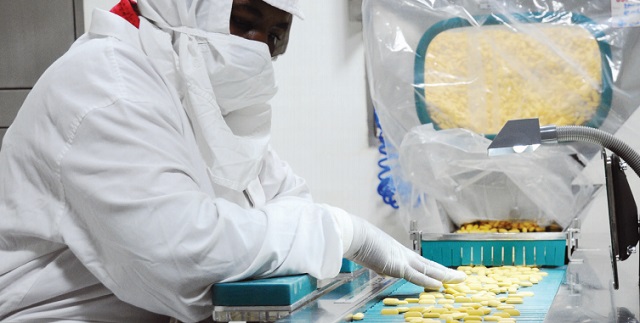
Pharmaceutical firm hopes to recover in second half of the year
Kampala, Uganda | ISAAC KHISA | Cipla Quality Chemicals Industries Ltd has recorded a decline in profit since it was listed on the Uganda Securities Exchange a year ago but its managers are now pinning its growth prospects on the increased drug capacity for the so-called third party demand.’
Financial results released on Dec.02 show that Cipla recorded a Shs14.5bn loss for the past six months ending Sept.30, down from a Shs3.3bn net profit recorded during the same period last year.
Management has attributed the fall in profit to reduced gross margins, impairment allowances, interest expenses and increased amortisation and depreciation charges.
The firm’s gross margin reduced from Shs32.8bn to Shs23.7bn while finance costs increased from Shs84million to Shs1.98bn during the same period under review.
On the other hand, amortisation and depreciation charges increased from Shs 2.55bn to Shs2.95bn. The shareholders will, therefore, not receive interim dividends.
Cipla’s share price has dropped from Shs265 during the Initial Public Offer to around Shs127 per share since most of the private investors sold their shares. Last year, Cipla recorded a sharp drop in net profit from Shs44.6bn to Shs6.8bn.
But the firm’s top executives – executive chairman, Emmanuel Katongole and CEO Nevin Bradford, noted in a joint statement that business is expected to be better in the second half of this year as Global Fund business rebounds.
“Based on the current visibility and run rates in the funder business, we expect continued acceleration from this revenue stream into the second half which will support strong growth compared to last year,” the firm said.
“Along with the President’s Malaria Initiative (PMI) and the ramp up of capacity in the fourth quarter to cater for the third party demand, we are confident we will meet our internal expectations and deliver strong growth in the second half and for a full year, despite a reduction in the Government of Zambia business.”
Cipla was awarded the USA’s PMI contract last year to manufacture and supply malaria treatments (Artemether Lumefantrine) to African countries including Rwanda and those outside Africa such as Myanmar which receives medicines funded by PMI.
The firm’s executives said the profit enhancement will also be delivered in the second half of this year though it is predicated on the Zambia payment plan being realised and no further provision required going forward.
Re-aligned reporting to IFRS 9
Cipla, for the first time, made an impairment allowance in line with the International Financial Reporting Standards 9 (IFRS9) in its books relating to government receivables due to the length of time taken to collect receivables from the Zambian government.
The firm said it had to consider impairment allowance as a result of Zambia’s delayed debt repayment to conform to the new financial reporting standards.
“The company remains committed to its supply agreement with the Zambian government, and we continue to have positive engagement as we work towards an agreed payment plan,” the firm said.
Cipla was listed on the USE in September 2018, becoming the first pharmaceutical company to list on the stock market in East Africa.
The firm focuses primarily on the production of the World Health Organization (WHO) pre-qualified first-line treatments for HIV/AIDS and Malaria.
It also manufactures the two first-line WHO recommended therapies for Hepatitis B, and obtained regulatory approval for the new first line triple combination ARV therapy for men, tenofovir lamivudine dolutegravir, from Uganda’s National Drug Authority in January this year.
In addition to its WHO prequalification, Cipla has been approved by national regulatory bodies in 14 African countries including, Kenya, Rwanda, Tanzania, Namibia, Ivory Coast, Zambia, Zimbabwe, Angola, and South Sudan.
During the first half of this year, the drug maker hosted regulatory inspections from WHO, the East African Community and Zazibona, the regulatory grouping of the Southern African states.
Cipla has also completed a capacity enhancement project that has increased its monthly output capacity by 30% to approximately 130 million tablets per month.
****
 The Independent Uganda: You get the Truth we Pay the Price
The Independent Uganda: You get the Truth we Pay the Price


